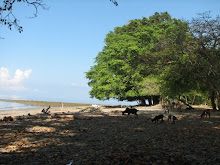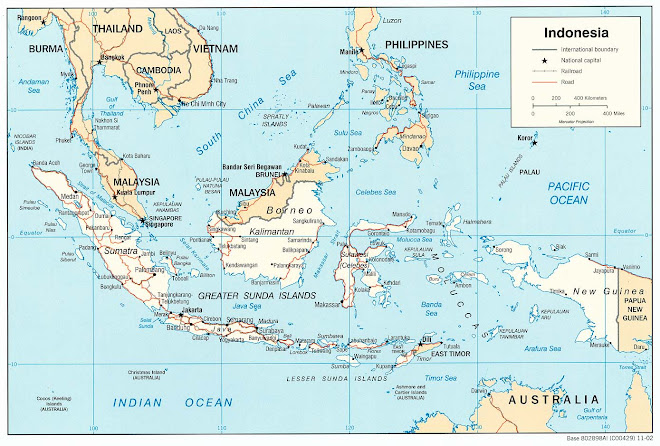 These ladies are waiting for their father, husband, and son while they are hunting for deer or the other animal. They spend the times by making handycraft which can be sold in the traditional market.
These ladies are waiting for their father, husband, and son while they are hunting for deer or the other animal. They spend the times by making handycraft which can be sold in the traditional market.
Saturday, July 26, 2008
Danis woman, West Papua Indonesia
 These ladies are waiting for their father, husband, and son while they are hunting for deer or the other animal. They spend the times by making handycraft which can be sold in the traditional market.
These ladies are waiting for their father, husband, and son while they are hunting for deer or the other animal. They spend the times by making handycraft which can be sold in the traditional market.
Saturday, July 19, 2008
Indonesian woman

Men of the Western world think that Indonesian women are quite beautiful and attractive. They are often attracted to the ethnic look that Indonesian women provide. Indonesian women often take very good care of themselves. Their personal hygiene is excellent and their beauty is natural. They are often quite smart as well. They are trained by society to be able to hold great and intelligent conversations about many things. Some of them are very interested in politics and other worldly issues and make perfect dinner companions.
Why man should love them? Because they are the total package. For a man to score a mail order bride from
Wednesday, July 9, 2008
Indonesian children

Children in Indonesia like just like other children. Most children like to read books with pictures, they don't like too many text. Children also like to play electronic toys such as PlayStation. Indonesia has up to 500,000 children — or 0.6 percent of the country's roughly 85 million children living in institutions, one of the highest rates in the world. Of those, 90 percent still have one or more parent alive. Most children have very little contact with their families, perhaps a brief visit home once a year, because they are too poor to travel.
They smile give us many expectations and hope for the glory of this country. In the morning, the children are happy; in the day time, the weather-beaten children are happy; in the afternoon, as well as the evening, midnight, and even dawn, the children are still happy.
(The picture was taken from: http://jimphoto.org/fotos)
About Indonesia

Indonesia, part of the “ring of fire,” has the largest number of active volcanoes in the world. Earthquakes are frequent. Wallace's line, a zoological demarcation between asian and australian flora and fauna, divides Indonesia. It lies in southeast asia. Comprising more than 17,000 islands, it is the world's largest archipelagic state. With a population of 222 million people in 2006[4], it is the world's fourth most populous country and the most populous muslim-majority nation, although officially it is not an islamic state. Indonesia is a republic, with an elected parliament and president. The nation's capital city is jakarta. The country shares land borders with papua new guinea, east timor and malaysia. Other neighboring countries include singapore, the philippines, australia, and the indian territory of the andaman and nicobar islands.
The Indonesian archipelago has been an important trade region since at least the seventh century, when the srivijaya kingdom formed trade links with china. Indonesian history has been influenced by foreign powers drawn to its natural resources. Under indian influence, hindu and buddhist kingdoms flourished from the early centuries ce. Muslim traders brought islam, and european powers fought one another to monopolize trade in the spice islands of maluku during the age of discovery. Following three and a half centuries of dutch colonialism, Indonesia secured its independence after world war ii. Indonesia's history has since been turbulent, with challenges posed by natural disasters, corruption, separatism, a democratization process, and periods of rapid economic change.
Across its many islands, Indonesia consists of distinct ethnic, linguistic, and religious groups. The javanese are the largest and most politically dominant ethnic group. As a unitary state and a nation, Indonesia has developed a shared identity defined by a national language, a majority muslim population, and a history of colonialism and rebellion against it. Indonesia's national motto, "bhinneka tunggal ika" ("unity in diversity" lit. "many, yet one"), articulates the diversity that shapes the country. However, sectarian tensions and separatism have led to violent confrontations that have undermined political and economic stability. Despite its large population and densely populated regions, Indonesia has vast areas of wilderness that support the world's second highest level of biodiversity. The country is richly endowed with natural resources, yet poverty is a defining feature of contemporary Indonesia.
.jpg)




